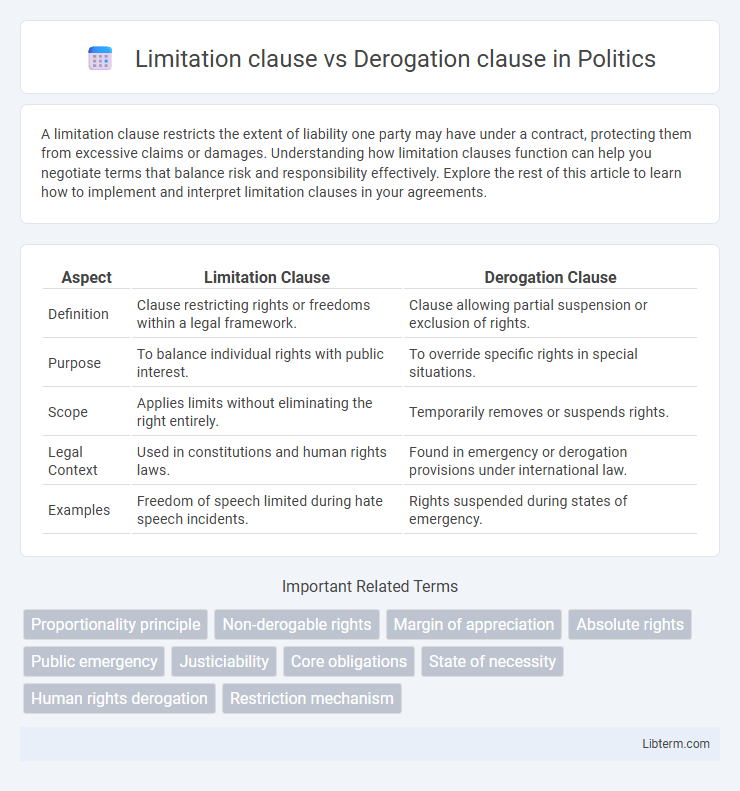A limitation clause restricts the extent of liability one party may have under a contract, protecting them from excessive claims or damages. Understanding how limitation clauses function can help you negotiate terms that balance risk and responsibility effectively. Explore the rest of this article to learn how to implement and interpret limitation clauses in your agreements.
Table of Comparison
| Aspect | Limitation Clause | Derogation Clause |
|---|---|---|
| Definition | Clause restricting rights or freedoms within a legal framework. | Clause allowing partial suspension or exclusion of rights. |
| Purpose | To balance individual rights with public interest. | To override specific rights in special situations. |
| Scope | Applies limits without eliminating the right entirely. | Temporarily removes or suspends rights. |
| Legal Context | Used in constitutions and human rights laws. | Found in emergency or derogation provisions under international law. |
| Examples | Freedom of speech limited during hate speech incidents. | Rights suspended during states of emergency. |
Introduction to Limitation and Derogation Clauses
Limitation clauses restrict the extent of liability or obligations within a contract, clearly defining the maximum scope for claims or damages. Derogation clauses, on the other hand, modify or exclude existing statutory rights, often overriding default legal provisions to tailor the parties' obligations. Understanding the distinction is essential for contract drafting and enforcement, as limitation clauses cap responsibilities while derogation clauses alter or remove certain legal entitlements.
Defining Limitation Clauses
Limitation clauses are contractual provisions that set a cap on the liability one party may incur under specific circumstances, effectively limiting financial exposure. These clauses are distinct from derogation clauses, which involve partial withdrawal or modification of statutory rights within a contract. Defining limitation clauses precisely helps ensure clear risk allocation and enforceability in commercial agreements.
Defining Derogation Clauses
Derogation clauses refer to contractual provisions that allow parties to deviate from or override specific statutory rights or obligations. Unlike limitation clauses, which typically restrict liability or damages, derogation clauses explicitly modify or exclude the application of certain legal rules within the contract framework. These clauses are critical in tailoring agreements to fit parties' specific needs by limiting default legal requirements.
Legal Foundations of Each Clause Type
Limitation clauses are grounded in contract law principles, designed to restrict the extent of liability parties may face, often relying on statutes like the Unfair Contract Terms Act 1977 in common law jurisdictions. Derogation clauses function by partially excluding or modifying statutory rights or obligations, thereby operating within a framework of legislative provisions that permit certain rights to be overridden or waived. The legal foundation of limitation clauses emphasizes consensual risk allocation while derogation clauses hinge on the extent to which statutory mandates allow contractual deviation.
Key Differences: Limitation vs Derogation Clauses
Limitation clauses restrict the scope of liability or obligations within a contract, often capping damages or excluding certain claims, while derogation clauses modify or override existing legal rights or statutory provisions. Limitation clauses primarily focus on limiting exposure to risk for one party, whereas derogation clauses allow parties to deviate from default legal rules to better suit their contractual agreement. Understanding these key differences is essential for drafting precise contracts and managing legal risks effectively.
Purpose and Scope of Limitation Clauses
Limitation clauses primarily serve to restrict or cap the liability of a party within a contract, defining the maximum amount or types of damages recoverable, thus providing predictability and risk management. Their scope typically includes specific types of losses or scenarios, such as consequential damages or breaches, preventing unlimited or disproportionate claims. In contrast, derogation clauses allow parties to override or exclude certain statutory provisions or default legal rules, altering the standard legal framework rather than merely limiting liability.
Purpose and Scope of Derogation Clauses
Derogation clauses serve to exclude or vary the application of specific statutory or contractual rights, allowing parties to tailor obligations and liabilities within defined limits. Their scope is typically narrower than limitation clauses, focusing on overriding particular provisions rather than broadly capping damages or liabilities. The purpose of derogation clauses is to grant flexibility in legal agreements by selectively modifying existing rights without negating the entire legal framework.
Practical Examples in International Law
Limitation clauses in international treaties set explicit boundaries on the scope or applicability of specific rights or obligations, such as the limitation on the use of force under Article 51 of the UN Charter. Derogation clauses allow states to temporarily suspend certain treaty obligations during emergencies, exemplified by the European Convention on Human Rights permitting derogations in times of war or public danger under Article 15. Practical examples include the UK invoking derogation clauses during terrorism threats, while limitation clauses are often seen in trade agreements restricting tariff reductions to protect domestic industries.
Impact on Human Rights and State Obligations
Limitation clauses allow states to restrict certain human rights under specific conditions, balancing individual freedoms with public interests but potentially enabling excessive or unjustified limitations. Derogation clauses permit temporary suspension of certain rights during emergencies, providing states with flexibility while raising concerns about prolonged or abusive use that undermines fundamental protections. Both clauses impact state obligations by requiring strict adherence to necessity, proportionality, and non-discrimination principles to safeguard human rights frameworks effectively.
Conclusion: Choosing the Right Clause in Legal Frameworks
Limitation clauses and derogation clauses serve distinct roles in legal frameworks, where limitation clauses restrict liability to predefined extents and derogation clauses allow parties to exclude certain statutory rights. Choosing the right clause depends on the specific legal objectives, jurisdictional constraints, and the desired balance between risk allocation and statutory compliance. Careful drafting ensures enforceability and aligns contractual terms with regulatory standards, minimizing litigation risks and protecting contractual interests.
Limitation clause Infographic

 libterm.com
libterm.com